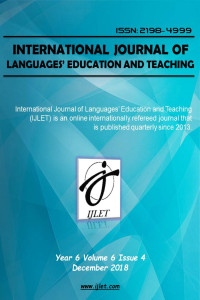Öz
A conspicuous explanation for sentential inheritance, i.e. the phenomenon of an expression’s taking over, in written or oral discourse, the semantic content of a full-fledged declarative sentence in toto, is given by means of the philosophically fabricated category of prosentence. A prosentence inherits the content of a previously (or only presumptively) uttered declarative sentence in analogy to a pronoun’s inheriting the content of a previously uttered noun – in other words, a prosentence is a sentential proform that functions similarly to the sentential variable employed in calculi of propositional logic. There are some expressions in natural languages that can be prima facie taken as instances of this category. This paper focuses on the instance of “öyle” in Turkish, and shows that the way “öyle” takes over sentential content in actual usage suggests a non-prosentential model of sentential inheritance, a model in which the inheriting expression functions rather as a pro-predicate, and the complementing (indeterminate) subject expression is ellipted. This pro-predicative-elliptical model employs a structurally more concrete and natural form, namely the traditional subject-predicate form, as the general and abstract form of a declarative sentence, which makes it a healthier alternative to the prosentential model based on the unnatural idea of a sentential variable.
Anahtar Kelimeler
Kaynakça
- Crystal, D. (1999). The Penguin Dictionary of Language. London: Penguin Books.
- Demircan, Ö. (2005). DÜŞÜM’e bağlı yanılgılar. Açık Sayfa (personal blog). Retrieved from: http://mintltd.com/2/demircan/acik02.htm#_ftnref5.
- Demirci, K. (2014). Pro-forms: Are Pronouns Alone in the Function of Representation? Bilig, 68: 97-116.
- Eker, S. (2011). Çağdaş Türk Dili. Ankara: Grafiker.
- Ergin, M. (2013). Türk Dil Bilgisi. İstanbul: Bayrak Basım Yayım Tanıtım.
- Gülsevin, G. (1997). Eski Anadolu Türkçesinde Ekler. Ankara: Türk Dil Kurumu.
- Grover, D. (1977). Inheritors and Paradox. The Journal of Philosophy, 74 (10): 590-604.
- Grover, D. (1992). A Prosentential Theory of Truth. Princeton: Princeton University Press.
Öz
Anahtar Kelimeler
Kaynakça
- Crystal, D. (1999). The Penguin Dictionary of Language. London: Penguin Books.
- Demircan, Ö. (2005). DÜŞÜM’e bağlı yanılgılar. Açık Sayfa (personal blog). Retrieved from: http://mintltd.com/2/demircan/acik02.htm#_ftnref5.
- Demirci, K. (2014). Pro-forms: Are Pronouns Alone in the Function of Representation? Bilig, 68: 97-116.
- Eker, S. (2011). Çağdaş Türk Dili. Ankara: Grafiker.
- Ergin, M. (2013). Türk Dil Bilgisi. İstanbul: Bayrak Basım Yayım Tanıtım.
- Gülsevin, G. (1997). Eski Anadolu Türkçesinde Ekler. Ankara: Türk Dil Kurumu.
- Grover, D. (1977). Inheritors and Paradox. The Journal of Philosophy, 74 (10): 590-604.
- Grover, D. (1992). A Prosentential Theory of Truth. Princeton: Princeton University Press.
Ayrıntılar
| Birincil Dil | İngilizce |
|---|---|
| Konular | Uygulamalı Dilbilim ve Eğitim Dilbilimi , Türkçe Eğitimi |
| Bölüm | Araştırma Makalesi |
| Yazarlar | |
| Yayımlanma Tarihi | 30 Aralık 2018 |
| Yayımlandığı Sayı | Yıl 2018 Cilt: 6 Sayı: 4 |


